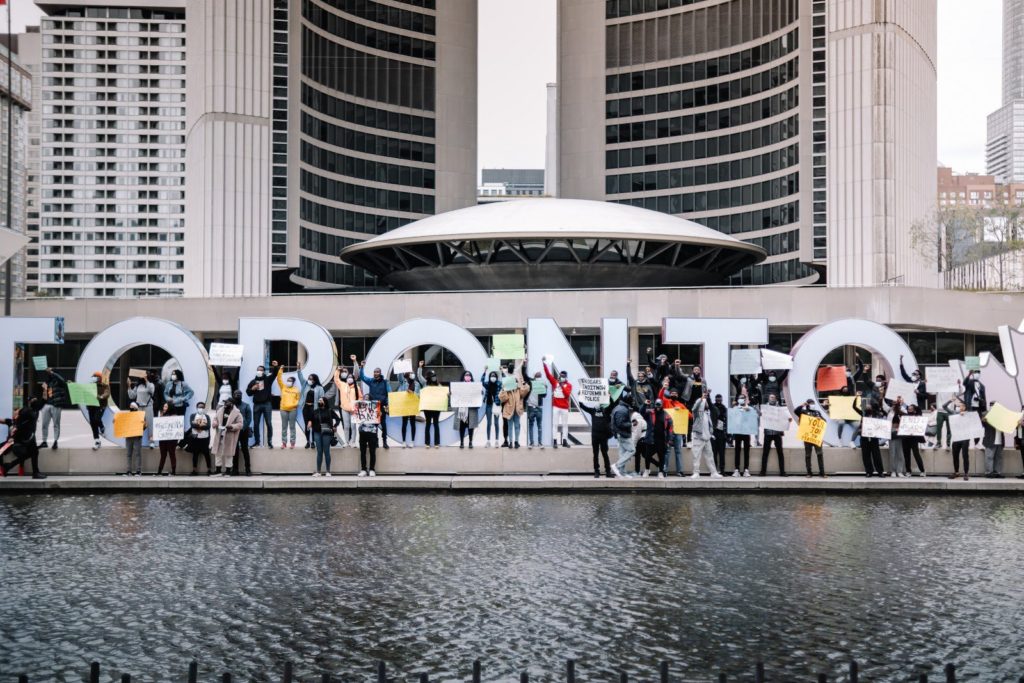Nigerian-Canadians and others say a special police unit is targeting innocent youth

For weeks, young Nigerians have gathered in downtown Toronto to draw Canada’s attention to the state violence in Nigeria.
The protests were sparked by recent acts of police brutality committed by the controversial Special Anti-Robbery Squad (SARS), a Nigerian police organization known for extorting, harassing, and killing innocent youth based on stereotypes about their appearance. If they have tattoos, dreadlocks, or own flashy cars and iPhones, officers label them as “yahoo boys,” a slang term for someone who carries out fraud or is involved in crime.
Kofi Bartels, a radio journalist in Nigeria’s Rivers State recently took to Twitter to describe how he was arrested and beaten after filming SARS officers assaulting another individual. “They took turns to slap, punch and kick me while I was struggling with a swollen knee. At least six officers, one at a time.”
Although the #ENDSARS movement was initially created in 2017, it recently resurfaced and gained traction on social media after a video depicting police fatally shooting an innocent man leaving a soccer viewing centre in the Delta State emerged earlier this month, sparking outrage and protests across the world.
The Nigerian government responded by banning the squad on Oct. 11, and President Muhammadu Buhari pledged “police reform,” while also announcing a new special weapons and tactics team (SWAT) in SARS’ stead. Protesters have since expressed fear that SWAT will simply be another way for Nigerian police to abuse their power.
Then, on Oct. 20, members of the Nigerian Armed Forces opened fire on peaceful protesters at the Lekki toll gate, resulting in a massacre that left many injured and dead.
This state violence and corruption has caused an international outcry, and driven many young Nigerians in Toronto to spread awareness and pressure the Nigerian government to implement systemic reform.
Approximately 100 people gathered in Nathan Phillips Square last week for a candlelight vigil, and protests have occurred every weekend for the past two weeks at Yonge and Dundas Square.
Sanjo Morgan, a third-year student at Sheridan College, attended multiple SARS protests in Toronto because, he says, the rest of the world does not know what is going on in his home country of Nigeria. He recalls being stopped several times and being asked about the movement, and says that it was genuinely spreading awareness about the issue.
Morgan says he was especially fed up with the Nigerian government’s lacklustre response to the killings. “They’re trying to pretend like nothing’s happened, trying to deny that anybody died,” he said, referring to Buhari’s 12-minute speech last Thursday where there was no acknowledgement of the peaceful protests, the innocent lives lost, or any aid for victims.
“I feel like (the Nigerian government’s) level of hard-headedness is going to be what brings this country to its knees,” said Morgan. “Too many people have lost their lives already and the 2023 election is way too far away for everyone to say, ‘we’ll change things then.’”
Temilade Fakunle, a first-year student at Prince Edward Island University currently living in Toronto, said he felt obliged to attend a protest not only as a Nigerian, but in solidarity with Nigerian youth, given that many individuals his own age were victims of the SARS killings while protesting in Nigeria.
Fakunle said that although social media activism helps to a certain extent, he felt like he needed to do something bigger.
The protest Fakunle attended began with a rally at Yonge and Dundas Square where people gave introductions and talked about the issue as a whole. They then remembered the names of those who lost their lives to SARS police brutality, sang Nigeria’s national anthem, and began marching down the streets where many chanted “end SARS” and held up their signs to inform onlookers.
Fakunle said that prior to the #ENDSARS movement he had lost hope of obtaining justice, because the previous generation seemed complacent with the Nigerian government, as if they were “settling.”
He was also disheartened because he felt that Nigeria and other countries in Africa were being excluded from the Black Lives Matter movement, despite being Black.
“Black Lives Matter is a movement for Black lives. Whether you’re Nigerian, a Black person in England, gay, transgender, whatever,” he said. “If you’re Black, your life matters, even in Nigeria.”
He said being around so many other Nigerians at the protest, all coming together and fighting for a common cause, gave him hope again.
Fakunle said he hopes that going forward, people continue to spread awareness and stay involved, especially those “who use Africa as an esthetic, but stay silent when (they) need help.”
